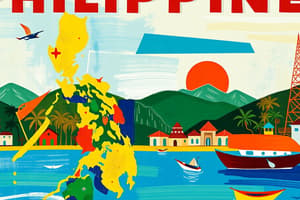Podcast
Questions and Answers
Что такое география в контексте туризма?
Что такое география в контексте туризма?
Какое определение туристического направления предлагает N.Leiper?
Какое определение туристического направления предлагает N.Leiper?
Почему география является важной составляющей туристических направлений?
Почему география является важной составляющей туристических направлений?
Что подчеркивают географические интерпретации туристических направлений?
Что подчеркивают географические интерпретации туристических направлений?
Signup and view all the answers
Почему туристическое направление с пляжами может быть привлекательным?
Почему туристическое направление с пляжами может быть привлекательным?
Signup and view all the answers
Какое влияние оказывает физическая среда, такая как горы, реки и побережье, на развитие туристических направлений?
Какое влияние оказывает физическая среда, такая как горы, реки и побережье, на развитие туристических направлений?
Signup and view all the answers
Почему климат играет ключевую роль в привлечении туристов?
Почему климат играет ключевую роль в привлечении туристов?
Signup and view all the answers
Какие естественные ресурсы могут привлечь туристов?
Какие естественные ресурсы могут привлечь туристов?
Signup and view all the answers
Какие элементы культурного наследия способствуют уникальности туристического направления?
Какие элементы культурного наследия способствуют уникальности туристического направления?
Signup and view all the answers
Что может повлиять на развитие туристического направления в контексте инфраструктуры?
Что может повлиять на развитие туристического направления в контексте инфраструктуры?
Signup and view all the answers
Study Notes
Geography: A Spatial Basis for Tourism Development
Geography, a branch of science that deals with the physical and human features of the earth, plays a crucial role in understanding the concept of a tourism destination. A tourism destination is not just a place, but a spatial system that summarizes, coordinates, and expresses the development of tourism. Let's explore the relationship between geography and tourism destinations.
Geography and Tourism Destinations
According to the definition by N. Leiper, a tourism destination is a location that attracts tourists to stay temporarily, primarily due to qualitative characteristics that are lacking in the tourist generating region. This definition encompasses a broad range of elements, including physical, cultural, and economic aspects, which are all interconnected and influenced by the geography of the area.
Geographical interpretations of tourism destinations have been among the earliest and most influential in the field. These interpretations emphasize the importance of understanding the physical environment, its natural resources, and the cultural landscapes that shape the tourist experience. For instance, a coastal destination might be attractive due to its beaches, while a mountainous region might offer opportunities for hiking and skiing.
Geography as a Spatial Basis
A tourism destination is considered a spatial basis, as it contains and expresses the development of tourism. It is a key component of tourism development, and its geographical features play a significant role in shaping the tourist experience. The article theorizes the geographical basis of a tourism destination, substantiating the components of its practical manifestation.
Geographical Space and Tourism Destinations
Is a tourism destination a kind of geographical space and what kind of variety is it? The answer to this question lies in understanding the various aspects of geographical space that contribute to the development of a tourism destination. These aspects include the physical environment, climate, natural resources, cultural heritage, and infrastructure.
Physical Geography: The physical environment, such as mountains, rivers, and coastlines, influences the development of tourism destinations. For example, a beach destination's popularity may depend on its sand quality and water temperature.
Climate: The climate of a destination plays a crucial role in attracting tourists. For instance, a tropical destination may offer year-round sunshine, while a ski resort requires cold winters and snow.
Natural Resources: Natural resources, such as forests, lakes, and wildlife, can attract tourists. For example, a national park may offer opportunities for hiking, fishing, and wildlife observation.
Cultural Heritage: Cultural landscapes, historical sites, and traditional practices contribute to the uniqueness of a destination. For example, a city with a rich historical heritage may attract tourists interested in history and culture.
Infrastructure: The availability of infrastructure, such as transportation, accommodation, and services, can influence the development of a tourism destination. For instance, a well-connected airport can make a destination more accessible and attractive to tourists.
The Relevance of Geography in Tourism Research
Given the importance of geography in shaping tourism destinations, it is essential for tourism research to focus on the geographical aspects of these destinations. This will help in understanding the unique characteristics of each destination and developing sustainable tourism practices.
In conclusion, geography plays a crucial role in understanding tourism destinations. It is the spatial basis that summarizes, coordinates, and expresses the development of tourism. By considering the physical environment, climate, natural resources, cultural heritage, and infrastructure, we can gain a comprehensive understanding of the geographical space that defines a tourism destination.
Studying That Suits You
Use AI to generate personalized quizzes and flashcards to suit your learning preferences.
Description
Explore the relationship between geography and tourism destinations in this quiz. Learn about how geographical factors such as physical environment, climate, natural resources, cultural heritage, and infrastructure shape tourism experiences. Understand the spatial basis of tourism destinations and their significance in tourism development research.




